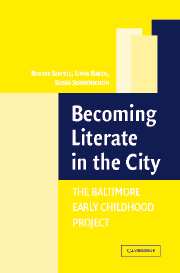Book contents
- Frontmatter
- Contents
- Preface
- 1 Early Appropriation of Literacy in Sociocultural Context
- 2 Growing Up in Baltimore : The Early Childhood Project
- 3 The Intimate Culture of Children's Homes
- 4 Processes of Literacy Enculturation in the Home
- 5 The Development of Literacy Competencies and Orientations
- 6 The Agenda and Practices of Schooling
- 7 Relations Between Homes and Schools
- 8 Conclusions and Implications for Policy and Practice
- References
- Name Index
- Subject Index
8 - Conclusions and Implications for Policy and Practice
Published online by Cambridge University Press: 17 December 2010
- Frontmatter
- Contents
- Preface
- 1 Early Appropriation of Literacy in Sociocultural Context
- 2 Growing Up in Baltimore : The Early Childhood Project
- 3 The Intimate Culture of Children's Homes
- 4 Processes of Literacy Enculturation in the Home
- 5 The Development of Literacy Competencies and Orientations
- 6 The Agenda and Practices of Schooling
- 7 Relations Between Homes and Schools
- 8 Conclusions and Implications for Policy and Practice
- References
- Name Index
- Subject Index
Summary
The longitudinal study of early literacy socialization presented in this book followed a cohort of Baltimore children in prekindergarten in 1992 through completion of third grade in 1997. The children and their families came from four broadly different social addresses, reflecting two levels of income and two types of ethnic heritage. Much of the focus of our study was on the intimate culture of children's homes; that is, the confluence of parental beliefs, recurrent activities, and interactive processes that inform children's literacy development. In this concluding chapter, we consider the broader implications of our findings for policy and practice.
We begin by summarizing and integrating the key findings of the research reported in the preceding chapters. Our account transcends the organizational structure of the preceding chapters to demonstrate how our broadly framed inquiry yields new insights into the socialization and appropriation of the cultural practice of literacy. We conclude this section with a discussion of why so many of the children in our study struggled to learn to read.
In the subsequent sections of the chapter we offer recommendations for teachers, parents, and policy makers. We discuss how parents, teachers, and children stand to benefit if teachers learn about the intimate culture of the family; we illustrate how the ecological inventory can serve as a tool for initiating productive home–school connections. We discuss how findings from the Early Childhood Project complement and extend recommendations offered to parents by professional organizations for promoting children's literacy development.
- Type
- Chapter
- Information
- Becoming Literate in the CityThe Baltimore Early Childhood Project, pp. 251 - 278Publisher: Cambridge University PressPrint publication year: 1958



